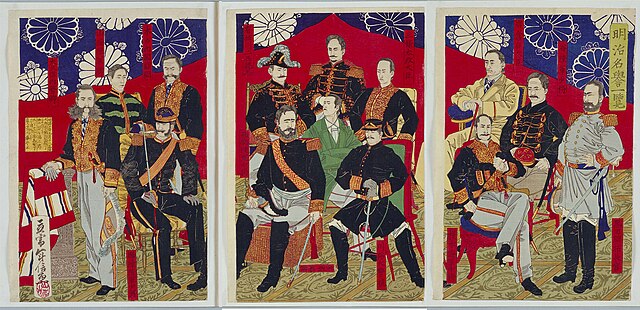Genrōin
Japanese governing body From Wikipedia, the free encyclopedia
The Chamber of Elders (元老院, Genrōin) was a national assembly in early Meiji Japan, established after the Osaka Conference of 1875. It is also referred to as the Senate of Japan, Genrōin being the word used to describe the Roman Senate, and other western legislatures named after it.

The Freedom and People's Rights Movement and liberals among the Meiji oligarchy had withdrawn from the Meiji government over their efforts to establish a national assembly with increased representative democracy. The Osaka Conference of 1875 attempted to address this issue by the establishment of the Genrōin, a national assembly whose members (theoretically appointed directly by the Emperor) were drawn from the peerage, upper ranks of the bureaucracy and various scholars. The Genrōin was only quasi-legislative, in that it had the power to review proposed legislation and make recommendations, but did not have the power to actually initiate any legislation. As an assembly, it replaced the Chamber of the Left (左院, Sain).
In 1876, the Genrōin was given the task of drafting a constitution for Japan, which it completed in 1880, only to have the draft rejected by Itō Hirobumi and Iwakura Tomomi as being too liberal.
The Genrōin was replaced by the Imperial Diet in 1890.
The Genrōin should not be confused with the Genrō, or elder statesmen. Most of the Genrō were members of the Genrōin, but not all members of the Genrōin were Genrō.
Chairman of the Genrōin
| Chairman | Term start | Term end | |
|---|---|---|---|
 |
Prince Arisugawa Taruhito (1835–1895) |
18 May 1876 | 28 February 1880 |
 |
Ōki Takatō (1841–1909) |
28 February 1880 | 21 October 1881 |
 |
Terashima Munenori (1832–1893) |
21 October 1881 | 13 July 1882 |
 |
Sano Tsunetami (1822–1902) |
12 September 1882 | 22 December 1885 |
 |
Count Ōki Takatō (1841–1909) |
22 December 1885 | 24 December 1889 |
 |
Count Yanagiwara Sakimitsu (1850–1894) |
24 December 1889 | 20 October 1890 |
References
- Banno, Junji. The Establishment of the Japanese Constitutional System. Routledge (1992). ISBN 0-415-00497-7
- Brunton, Richard. Building Japan 1868-1876. RoutledgeCurzon (1995). ISBN 1-873410-05-0
- Buruma, Ian. Inventing Japan: 1853-1964. Modern Library; Reprint edition (2004) ISBN 0-8129-7286-4
- Sims, Richard. Japanese Political History Since the Meiji Renovation 1868-2000. Palgrave Macmillan. ISBN 0-312-23915-7
Wikiwand - on
Seamless Wikipedia browsing. On steroids.
